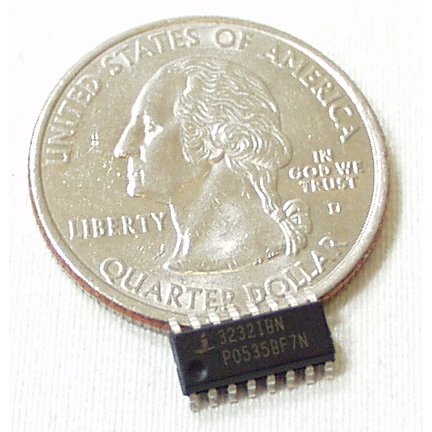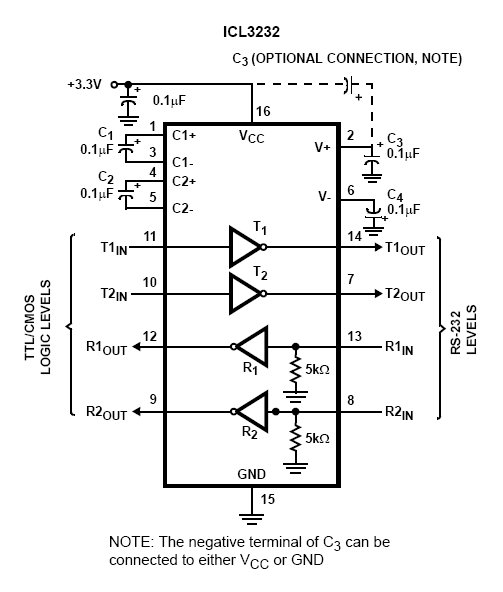The 'must have' IC for 3V projects. This is the RS232 converter IC that is capable of running at 3V and communicating with 3V logic. Comes in an easy to solder 16-Pin SOIC SMD package. Requires four external 0.1uF ceramic capacitors - no more 10uF monsters! Operates from 2.7V to 6V.
- [Datasheet ](http://cdn.sparkfun.com/datasheets/Components/General IC/SP3232EBCA-L.pdf)(3232EB)
RS232 Converter SMD - MAX3232 Product Help and Resources
Core Skill: Soldering
This skill defines how difficult the soldering is on a particular product. It might be a couple simple solder joints, or require special reflow tools.
Skill Level: Competent - You will encounter surface mount components and basic SMD soldering techniques are required.
See all skill levels
Core Skill: Programming
If a board needs code or communicates somehow, you're going to need to know how to program or interface with it. The programming skill is all about communication and code.
Skill Level: Rookie - You will need a better fundamental understand of what code is, and how it works. You will be using beginner-level software and development tools like Arduino. You will be dealing directly with code, but numerous examples and libraries are available. Sensors or shields will communicate with serial or TTL.
See all skill levels
Core Skill: Electrical Prototyping
If it requires power, you need to know how much, what all the pins do, and how to hook it up. You may need to reference datasheets, schematics, and know the ins and outs of electronics.
Skill Level: Competent - You will be required to reference a datasheet or schematic to know how to use a component. Your knowledge of a datasheet will only require basic features like power requirements, pinouts, or communications type. Also, you may need a power supply that?s greater than 12V or more than 1A worth of current.
See all skill levels
Comments
Looking for answers to technical questions?
We welcome your comments and suggestions below. However, if you are looking for solutions to technical questions please see our Technical Assistance page.
Customer Reviews
No reviews yet.



I am thinking to have LED indicators for the TTL outputs of MAX 3232 for RX and TX indication. How much current these line drivers(TTL outputs) can source to have LED indication OR do i need to use transistor drive for the same. Thanks..
Good question, and this information isn't in the datasheet. I would expect the logic side to have enough source/sink capability to directly drive high efficiency (5mA) LEDs, but transistor drive would be the safest approach (and wouldn't load down the logic to your communications port). If you try it, let us know how it works.
I thought these would work with a bread board but now i see they are smd, is there any DIP versions of this ??
Who's bright ideas was it to not supply the DIP version of this and only SMD? I now have to go buy the DIP version elsewhere.
The description says to attach ceramic capacitors, but the datasheet shows electrolytic capacitors. Could someone help with the wiring?
Before I buy this, just to get it clear:
1. Will this work without a hitch in a 5V circuit?
2. Will it serve the same function as the FTDI FT232RL that is used for serial data transmission in the Arduino Duemilanove?
3. Are the V+ and V- lines a reference voltage generated by the IC, or are they input voltages that the user has to supply?
I think that the answers are:
1. Yes.
2. Yes.
3. Internally generated voltages.
But I am not 100% sure. Can someone please clarify?
1) According to the datasheet, it should work fine at 5V.
2) No, this is a TTL to RS232 level converter. It is not a USB to TTL Serial adapter.
3) According to the datasheet (Read it!), they connect to capacitors only.
You're right, we'll add it to the next revision. I believe it's pin-compatible with the MAX232 footprint though.
The part in the Eagle Library seems to be for the DIP part, not the SMD part, unless I'm missing something.